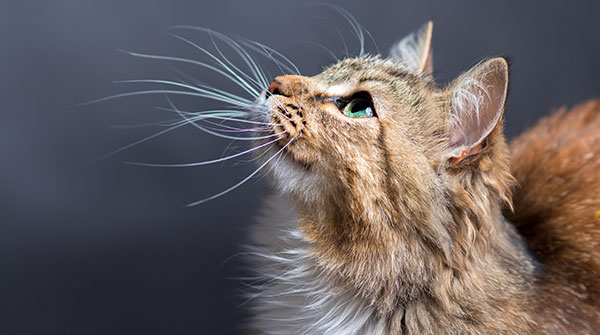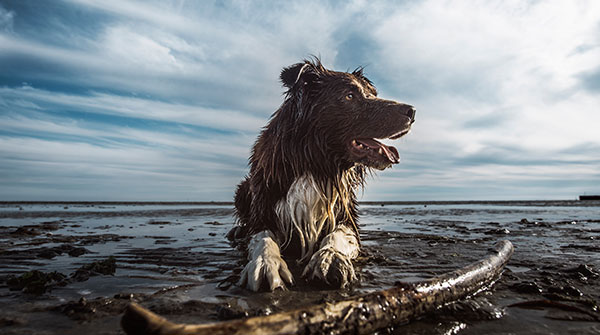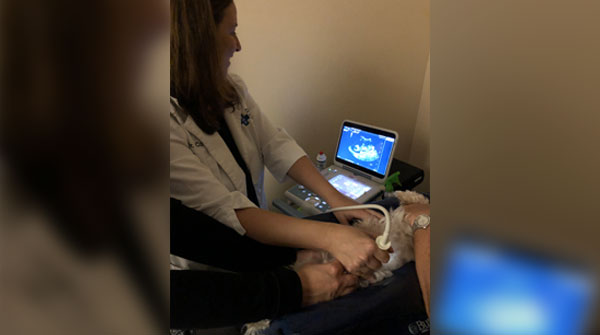Preventive Medicine

We take great pride in preventive medicine and physical exams. Our first appointment with a new pet always takes about an hour. It's important to us
to get to know you, let you get to know us, and look deeply into your pet's health. This includes carefully examining each of your pet's major biological systems. We are incredibly gentle, thorough, and compassionate. We will examine your pet for the subtle signs of issues or illness, and will prepare a preventive plan to make sure your pet stays happy, healthy, and by your side. Because the bond you share with your pet is precious, and we exist to protect it.
Dentistry

We are passionate advocates of animal dentistry. We know how much of an impact it can have on a pet's level of pain, quality of life, and longevity. Many
pet owners aren't aware that the vast majority of pets over the age of three have signs of periodontal disease. This is a progressive illness that robs your pet of comfort, erodes supporting structures in their mouth, and can even wreak havoc on their internal organs if it gets to an advanced stage. But not to worry - periodontal disease is no match for our team! We perform thorough dental cleanings, and can perform other forms of oral surgery for more advanced cases. Trust us, your pet would thank you if they could!
Surgery

You love your pet like family. So it can be an anxious time when your pet needs surgery - whether it be for a spay/neuter procedure, or something
more complicated. We built our facility to be a truly world-class veterinary hospital. The technology used here is similar to what you would hope for out of a high quality human hospital, and the training and talent of the staff is truly exceptional. We take your pet's safety seriously, and design our protocols around making sure your pet is in the best of hands.
Vaccinations

Vaccinations are an important (and easy!) component of veterinary medicine. We will recommend a regiment based on your dog or cat's lifestyle,
background, and unique health and behavioral needs. All dogs and cats are required to receive rabies vaccinations, and many other vaccines may be a smart part of a comprehensive health plan. Please give us a call if you have any questions!
Parasite Control

See a mosquito recently? Yes, they're everywhere here! That's why it is so important to make sure your pet has been tested for heartworms, a
potentially fatal illness caused by mosquitoes. We provide heartworm preventives to make sure that your pet is safe from these blood-suckers! And we also provide flea and tick control. Fleas and ticks can also cause potentially serious health conditions, and are very uncomfortable for dogs and cats to experience nonetheless.
Diagnostics

The diagnostic capabilities here are truly state-of-the-art. We have invested in these advanced tools because we know how important it is to be able to
quickly pinpoint the source of a health issue, or rule out other possible causes of a symptom. The imaging and lab capabilities here are similar to what you would find at a specialty veterinary hospital. We do it because we believe your pet deserves access to the best medicine the field has to offer, every single visit.
Laser Therapy

Laser therapy is a cutting edge technology in veterinary medicine. Through light energy, it causes physiological changes at the cellular level in your pet
that reduce inflammation, pain, and improve the body's ability to heal itself. This is a remarkable technology for pets healing from surgery, injury, or for pets who suffer from chronic or acute pain caused by arthritis or other conditions.
Laser Surgery

The newest technology in veterinary surgery is the use of lasers in making many procedures less painful and more precise. Lasers are intense beams of
light that are used to cut tissue by vaporizing the water found in that tissue.
The major benefits of laser surgery include:
Less bleeding
As the laser cuts tissue it seals small blood vessels. With the decrease in bleeding, the veterinarian can see the surgical site more clearly and perform with greater precision. This can result in shorter surgery time with less anesthesia.
Less pain
As the laser cuts tissue it seals nerve endings. This results in less post-operative pain for your pet. This feature is especially notable in feline declaws. In most cases, no tourniquet is needed during surgery and no post-operative bandaging is required. Cats are usually up and around the same day with minimal need for pain management.
Less swelling
As the laser cuts tissue lymphatic vessels are sealed. This means less post-operative swelling.
Less post-surgical complications
-The laser can be used to seal the ends of the vessels resulting in decreased risk of post-operative bleeding.
-A laser sterilizes as it cuts, decreasing post-operative infection.
-Unlike a scalpel, the laser tip never touches the tissue so cancer cells are not dragged and seeded elsewhere during tumor removal.
For these reasons, patients undergoing laser surgery have a faster and more comfortable return to normal function.
The major benefits of laser surgery include:
Less bleeding
As the laser cuts tissue it seals small blood vessels. With the decrease in bleeding, the veterinarian can see the surgical site more clearly and perform with greater precision. This can result in shorter surgery time with less anesthesia.
Less pain
As the laser cuts tissue it seals nerve endings. This results in less post-operative pain for your pet. This feature is especially notable in feline declaws. In most cases, no tourniquet is needed during surgery and no post-operative bandaging is required. Cats are usually up and around the same day with minimal need for pain management.
Less swelling
As the laser cuts tissue lymphatic vessels are sealed. This means less post-operative swelling.
Less post-surgical complications
-The laser can be used to seal the ends of the vessels resulting in decreased risk of post-operative bleeding.
-A laser sterilizes as it cuts, decreasing post-operative infection.
-Unlike a scalpel, the laser tip never touches the tissue so cancer cells are not dragged and seeded elsewhere during tumor removal.
For these reasons, patients undergoing laser surgery have a faster and more comfortable return to normal function.
Seasonal Visits

Are you a snow bird? Trust us, we get it! Many pet owners who escape the cold of the northern states trust us with their pets during their Florida visits.
We have formed so many strong bonds with people like you because we pride ourselves on communicating with your regular veterinarian to truly be on the same team and understand the full medical context of your visit. We will work together with your primary veterinarian to make sure that your pet's health care doesn't skip a beat!
Flying with your Pet

There are several different forms which may be required in order for you to fly with your pet. It varies by airline so please call your airline well in advance
so we can get the appropriate forms filled out and any required testing. Some types of forms you may need include:
USDA Health Certificate: This requires a physical exam by a doctor on the day the form is filled out, a fecal flotation (which will need to be dropped off at least 48 hours prior to your pet’s exam) and a deworming. This must be done within 7 days of your departing flight and is good for 30 days. If your return flight is more than 30 days later, you will need to get another exam and health certificate prior to your return. Alternatively you can schedule your initial Health Certificate exam closer than 7 days to your departure. Please keep in mind, if your pet is positive for an intestinal parasite, it will need to be noted on the health certificate and you may be prevented from flying. Because of this, it would be best to drop off a fecal sample 10 days ahead of time so any parasites found can be treated and delays in travel can be avoided.
Airline Flight Certificates/Veterinary Health forms: These are getting more common. These need to be filled out and signed by a veterinarian, but do not usually require an exam. These vary by airline and each have different requirements. One example is…..
The animal described above was last examined by me on: ___________
At the time of this physical examination, the animal appeared to be free of infectious or contagious diseases that would endanger other animals or public health.
***If the above line in red is included, a fecal exam would be needed (please drop off 10 days prior to flight so certain parasites can be treated and delays in travel can be avoided)
The animal is current as of the date of this form for the following vaccinations:
Rabies Vaccine:
Date given:
Valid through:
Distemper Vaccine:
Date given:
Valid through:
The animal’s owner (or owner's agent) has represented to me that (choose one):
___ The animal has not bitten, scratched or otherwise injured or attacked any person.
___ The animal has bitten, scratched or otherwise injured or attacked a person. The situation leading to the bite, scratch or injury was described as follows:
Veterinarian’s license number:
License date of expiration:
State or other jurisdiction in which license was issued:
Veterinarian's name (print):
Business phone contact:
Business email contact:
Veterinarian’s Signature:
Date:
USDA Health Certificate: This requires a physical exam by a doctor on the day the form is filled out, a fecal flotation (which will need to be dropped off at least 48 hours prior to your pet’s exam) and a deworming. This must be done within 7 days of your departing flight and is good for 30 days. If your return flight is more than 30 days later, you will need to get another exam and health certificate prior to your return. Alternatively you can schedule your initial Health Certificate exam closer than 7 days to your departure. Please keep in mind, if your pet is positive for an intestinal parasite, it will need to be noted on the health certificate and you may be prevented from flying. Because of this, it would be best to drop off a fecal sample 10 days ahead of time so any parasites found can be treated and delays in travel can be avoided.
Airline Flight Certificates/Veterinary Health forms: These are getting more common. These need to be filled out and signed by a veterinarian, but do not usually require an exam. These vary by airline and each have different requirements. One example is…..
The animal described above was last examined by me on: ___________
At the time of this physical examination, the animal appeared to be free of infectious or contagious diseases that would endanger other animals or public health.
***If the above line in red is included, a fecal exam would be needed (please drop off 10 days prior to flight so certain parasites can be treated and delays in travel can be avoided)
The animal is current as of the date of this form for the following vaccinations:
Rabies Vaccine:
Date given:
Valid through:
Distemper Vaccine:
Date given:
Valid through:
The animal’s owner (or owner's agent) has represented to me that (choose one):
___ The animal has not bitten, scratched or otherwise injured or attacked any person.
___ The animal has bitten, scratched or otherwise injured or attacked a person. The situation leading to the bite, scratch or injury was described as follows:
Veterinarian’s license number:
License date of expiration:
State or other jurisdiction in which license was issued:
Veterinarian's name (print):
Business phone contact:
Business email contact:
Veterinarian’s Signature:
Date:

